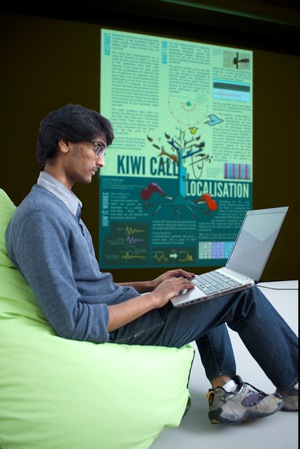Curiosity - the key to new ideas
10 Sep 2015 - 11:49:20 in Achievement
 Since Lohit Petikam was young, he's been curious about how things work. As his understanding grew, his curiosity shifted to how he could make things work. Teamed with his expanding interest in maths and a realisation of the power of computers, Lohit's curiosity transformed into a new hobby—programming.
"I found myself making things, like small games and music visualisations. Then I developed an obsession for making electronic music. The concepts in music technology that appealed most were quite heavy in maths and physics—so I got into electronics and signal processing, hoping to gain a better understanding of what my music software was doing behind my back."
Music and sound have continued to intertwine with Lohit's more analytical side as he has pursued his studies in Electronic and Computer Systems Engineering—with some music papers on the side. A Summer Research Scholarship recording kiwis is a good example of this.
"My scholarship was about taking stereo audio recordings of kiwi calls, then using analysis techniques to estimate the direction the call came from. The recordings can be used as a low cost and easy way of understanding kiwi movement habits in native bush. Three main algorithms were tested to see how well the recordings could tell the direction, and how they coped with both noise and echo in the environment."
After doing the research, Lohit took part in the Summer Gold Poster Competition, designing a poster that explained his research to the general public.
"I was keen to do this from the start, because I felt that people could learn more about engineering if they weren't intimidated by abstract concepts and maths equations. I have some experience tutoring—both first-year and secondary school students—so I applied what I'd learnt there and described my research in an intuitive way, using design and graphics to make it visually appealing."
Another highlight for Lohit has been making a speech synthesizer controlled by a glove interface—enabling users to make human voice sounds with their hands.
For Lohit, it's the practical side of the Engineering programme that makes it so worthwhile.
"The programme forces you to get your hands dirty—through practical labs and assignments. It leaves you with the experience and skills to build what you want.
Students need to do their own research before accomplishing a goal. Though time-consuming, the projects have been rewarding because you end up with a finished product that you can call your own."
Since Lohit Petikam was young, he's been curious about how things work. As his understanding grew, his curiosity shifted to how he could make things work. Teamed with his expanding interest in maths and a realisation of the power of computers, Lohit's curiosity transformed into a new hobby—programming.
"I found myself making things, like small games and music visualisations. Then I developed an obsession for making electronic music. The concepts in music technology that appealed most were quite heavy in maths and physics—so I got into electronics and signal processing, hoping to gain a better understanding of what my music software was doing behind my back."
Music and sound have continued to intertwine with Lohit's more analytical side as he has pursued his studies in Electronic and Computer Systems Engineering—with some music papers on the side. A Summer Research Scholarship recording kiwis is a good example of this.
"My scholarship was about taking stereo audio recordings of kiwi calls, then using analysis techniques to estimate the direction the call came from. The recordings can be used as a low cost and easy way of understanding kiwi movement habits in native bush. Three main algorithms were tested to see how well the recordings could tell the direction, and how they coped with both noise and echo in the environment."
After doing the research, Lohit took part in the Summer Gold Poster Competition, designing a poster that explained his research to the general public.
"I was keen to do this from the start, because I felt that people could learn more about engineering if they weren't intimidated by abstract concepts and maths equations. I have some experience tutoring—both first-year and secondary school students—so I applied what I'd learnt there and described my research in an intuitive way, using design and graphics to make it visually appealing."
Another highlight for Lohit has been making a speech synthesizer controlled by a glove interface—enabling users to make human voice sounds with their hands.
For Lohit, it's the practical side of the Engineering programme that makes it so worthwhile.
"The programme forces you to get your hands dirty—through practical labs and assignments. It leaves you with the experience and skills to build what you want.
Students need to do their own research before accomplishing a goal. Though time-consuming, the projects have been rewarding because you end up with a finished product that you can call your own."
